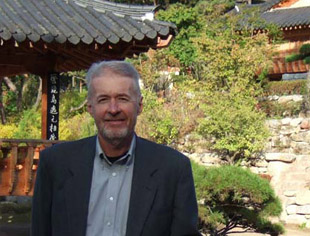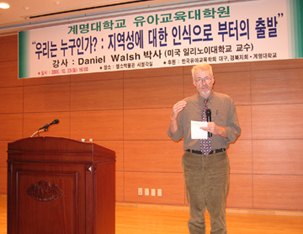 Editorial note: This lecture, organized and sponsored by the Keimyung Graduate School of Early Childhood Education and the Daegu & Gyeongbuk Division of Korean Society for Early Childhood Education, was given by Dr. Daniel J. Walsh (Curriculum & Instruction, University of Illinois at Urbana-Champaign) on Oct. 23 at Hengso Museum. The Gazette carries the lecture in three parts.
Editorial note: This lecture, organized and sponsored by the Keimyung Graduate School of Early Childhood Education and the Daegu & Gyeongbuk Division of Korean Society for Early Childhood Education, was given by Dr. Daniel J. Walsh (Curriculum & Instruction, University of Illinois at Urbana-Champaign) on Oct. 23 at Hengso Museum. The Gazette carries the lecture in three parts.“I do well with the simple things of daily life. Those things are my language. Do you understand? My language is that one [the language of the simple things of daily life]. That one I manage well. With that one I am perfectly at ease.” Ana, a Portuguese kindergarten teacher). (Vasconcelos & Walsh, 2001)
Today I want to talk about teaching and research. In order for researchers and teachers to be effective they must be able to talk to each other. Those of us who are both teachers and researchers need to be able to maintain these identities. But we also have to be able to communicate well between these two selves as we move back and forth between our research and our teaching. Our research and teaching should inform each other.
I began this paper with the eloquent words of Ana, a kindergarten teacher in Portugal, because they illustrate my three main points.
1. Teaching and research share a focus on the particular—on specific details. They differ, however, in their purpose.
2. Both teaching and research occur within culture.
3. Both teaching and research should share a common language, and this language should be an accessible, straightforward one—the language of the simple things of daily life.
I will begin by sharing a little about me as a teacher and a researcher.
The Researcher
As a researcher, I study folk psychology (Bruner, 1990, 1996), that is, the deeply embedded beliefs in a given culture about what makes people tick—how they think, why they do what they do, what they should do, and so on. Folk psychology would exist even if the academic field of psychology did not. Folk psychology sometimes contradicts it academic counterpart, other times support it, and still other times has nothing to do with it. Folk psychology does not, however, reside in textbooks or scholarly writings. It resides in the deep structure of cultural beliefs, beliefs that are taken for granted and are most often invisible to those that hold them. Folk psychology permeates daily life in a culture more than does academic psychology.
I study folk psychology because from it flows a culture’s folk pedagogy (Bruner, 1990, 1996), that is, the deeply embedded beliefs about how people learn and how they should be taught. Like folk psychology, folk pedagogy is not in the text books or the journals. In the daily life of the classroom, its influence can be dominant.
The basic assumption underlying my research is that unless teacher educators identify and take folk psychology and pedagogy seriously, efforts to educate teachers will be ineffective. We will lay academic psychological beliefs and academic pedagogical beliefs over these underlying beliefs and values rather than connecting with them. All learning begins with what is already known. Unless what we teach connects to what people already know, it will never really be learned, that is, become part of a teacher’s knowledge and belief system—who they are as teachers.
The Teacher
At the undergraduate level, I teach the core two-course sequence in the Early Childhood teacher education program. At the graduate level I teach courses in two areas: (a) research methods, and (b) early childhood education. My goal is to expose students to the best knowledge, skills, attitudes, and beliefs related to teaching, learning, development, and doing research and to help them connect these knowledge, skill, attitudes, and beliefs to those they bring into the class room.
With undergraduates, for example, I work to connect a cultural developmental perspective to the perspectives they bring into the classroom with them. We explore their folk psychology and their folk pedagogy because these form the basis for their learning. Some of this folk knowledge we will modify. Some of it we will develop. But it is where we begin. Unless I am able to connect what I teach to what students already know, they will never really learn it. It will not become part of their knowledge and belief systems—who they are as teachers or researchers.
As you can see, the same basic assumption informs both my research and my teaching.

What is General Nature?
Is there such a Thing?
What is General Knowledge?
Is there such a Thing?
Strictly Speaking All Knowledge is Particular (William Blake)
The psychologist Margaret Donaldson (1978) observed that all knowledge begins as local knowledge. That is true of young children, and it is true of us older teachers and researchers. Everything we know began as local knowledge filtered through existing cultural belief systems. The anthropologist Clifford Geertz described research as “extremely extended acquaintances with extremely small matters” (1973, p. 21). He could have been describing teaching too.
Sometimes we take that local knowledge and make inferences that go beyond the local, which is research. Sometimes we take that local knowledge and apply it to the situation at hand, which is teaching. Both are important.
We are tempted in early childhood education by the universal. Tempted by Piaget’s universal stages, we became ardent Piagetians. And, unfortunately, many in the field remain ardent Piagetians long after the larger world of developmental psychology moved beyond it (e.g., Bruner & Haste, 1987; Donaldson, 1978, 1996; Gelman & Baillargeon, 1983). We have always been attracted to grand theories, for example, Freud, Gesell, Piaget. The day of the grand theories of the 20th century is over. The theories of learning and development of this century are and will be smaller, more situated, and more cultural.
Teaching
When teachers enter a classroom, they enter a local world, a particular world. There they encounter specific undergrad or graduate students. Good teaching requires understanding these students, not all students, but these student right here, right now.
Good teaching begins with seeing the students, understanding where they are coming from and where they think they want to go (Ayers, 1993). This can only be done in the moment. Good teachers, whether they teach kindergarten children or grad students, live in the moment. They concentrate on these students, right here, right now. They leave what they know about people in general and enter the world of these particular people.
To give an example: Students who apply to our teacher education program must write an essay. I don’t find the essays helpful because they are formulaic, not so much about what the undergrad applicants think as much as about what they think we want to hear. Almost every applicant, at some point in the essay, writes about how much they love children—“I just love children.” I am always troubled by this notion that one can love some group in the abstract. Love is something we have for specific people. Love is particular. It is specific.
Research
Researchers also focus on the particular. For example, they do not study classrooms in general, but a particular classroom or set of classrooms. But their goal is to move beyond the particular to the general, from what they learn here to what they can say about other classrooms. Good researchers do so cautiously, knowing that what they learn in one context will apply to some other contexts, but not all. Their challenge is figure out how and to what to generalize.
Both teachers and researchers focus on the particular. As I noted earlier, both teachers and researchers produce knowledge. Teachers produce local knowledge, knowledge that is particular to this classroom. Researchers produce general knowledge, knowledge that is applicable to some other classrooms. Both kinds of knowledge are important.
The Tension
A tension exists between local knowledge and general knowledge. This tension serves an important function—it keeps both teachers and researchers honest. Local knowledge can easily become too local, that is, one may become so focused on the particular that one fails to step back and check to see if what one is learning is accurate. General knowledge can easily become disconnected from reality unless one continual checks it against the local reality.
Unfortunately a tension can also exist between teachers and researchers, particularly in applied fields where theory is expected to inform practice, and vice versa. The question often becomes, “Who are we? Researchers or teachers?”
In my experience in American universities, professors who view themselves primarily as researchers look down on those they see as mere teachers, and those who view themselves primarily as teachers look down on the researchers. These attitudes are self-defeating.
I work to be both. Not everyone want to do both, but I have become convinced that one cannot really do good research on schooling if one is not devoted to teaching. If we are to be both, the question becomes this: How do we forge an identity that allows us to function well as both? The answer has three parts. The first is that, as I have been arguing, that both teaching and research share a focus on the particular. They both begin locally. Teachers and researchers differ less in what they do than in their goals. The second and third involved culture and language, which I now discuss. (To be continued)
References
Ayers, W. (1993). To teach: The journey of a teacher. New York: Teachers College.
Bruner, J. (1990). Acts of meaning. Cambridge: Harvard.
Bruner, J. (1996). The culture of education. Cambridge: Harvard.
Bruner, J. S., & Haste, H. (1987). Making sense: The child’s construction of the world. London: Methuen.
Donaldson, M. (1978). Children’s minds. New York: W.. Norton.
Gelman, R., & Baillargeon, R. (1983). A review of some Piagetian concepts. In P. H. Mussen (Ed.), Handbook of child psychology, volume III, cognitive development [J. Flavell & E. M. Markham, volume editors] (pp. 167-230). New York: Wiley.
Vasconcelos, T., & Walsh, D. J. (2001). Conversations around the Large Table: Building Community in the Daily Life of a Portuguese Kindergarten. Early Education and Development, 12, 499-522.








